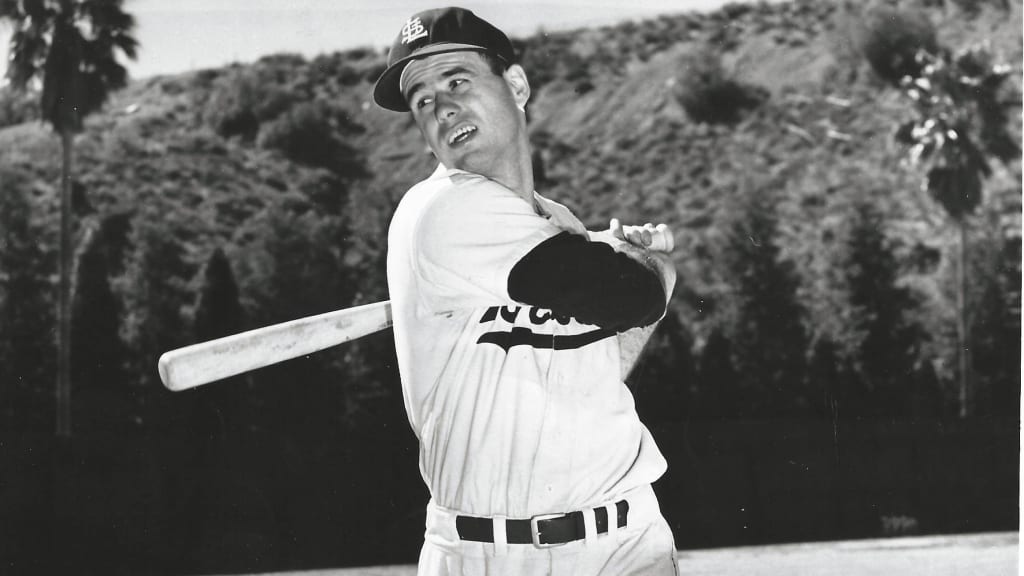
Ed Mickelson, affectionately known in St. Louis as “The Last Brown in Town” from his time playing first base for the city’s other professional baseball franchise, died peacefully on June 27. He was 98 years old.
Prior to his death, Mickelson was one of just two living members of the Browns -- the American League counterpart to the Cardinals in St. Louis from 1902-53 -- and he was the only one who still called the Gateway City home. Mickelson, who spent far more time in the Minor Leagues (11 seasons) than the big leagues (three seasons), played just seven games with the Browns in 1953, but he is credited with driving in that franchise’s final run at Sportsman's Park before it moved to Baltimore and became the Orioles.
Mickelson played singular seasons with the Cardinals (1950), Browns (1953) and Cubs (1957) and spent 93 days total at the MLB level. He went 3-for-37 with a double, three RBIs, four walks and two runs scored in 18 career MLB games. The 6-foot-3, 205-pound Mickelson spent parts of 11 seasons in the Minor Leagues, hitting .316 with 108 home runs and 839 RBIs in 1,189 games.
Edward Allen Mickelson was born on Sept. 9, 1926, in Ottawa, Ill., about halfway between Chicago and Peoria. By the time Mickelson turned 11, the family had moved to St. Louis. He went on to star in baseball, basketball and football, earning a football scholarship to the University of Tennessee. But a bout of homesickness in Knoxville prompted him to leave Tennessee before classes started and enroll closer to home at the University of Missouri, where he started as a freshman on both the varsity football and basketball teams, according to his SABR bio.
Mickelson enrolled in the Army Air Corps and left Missouri early in 1945 for basic training. After leaving the service in 1946, he received a baseball scholarship to Oklahoma A&M -- now known as Oklahoma State -- and also played for legendary men’s basketball coach Hank Iba.
Mickelson landed a tryout with the Cardinals in 1947 and was eventually signed for $2,000. He appeared in 55 games for Class B Decatur, batting .251/.311/.353, and after the season married Jo Ann Menzel, his high school sweetheart.
After making four Minor League stops during the 1949-50 seasons, Mickelson made his MLB debut just nine days after his 24th birthday, on Sept. 18, 1950, pinch-hitting for pitcher Erv Dusak with the bases loaded in the top of the eighth at New York’s Polo Grounds. He struck out looking in a game the Giants won, 13-0. Three days later in Boston, he made his first start at first base and batting cleanup, filling in for the most famous Cardinal in club history, future Hall of Famer Stan Musial, in the first game of a doubleheader against the Braves.
“‘Hey kid,’ [manager Eddie Dyer] says. ‘You’re playing today. Musial's got a 103-degree fever and he’s out for the day and you’re in there,’” Mickelson told St. Louis TV station KSDK. “Oh, by the way, [future Hall of Famer] Warren Spahn is pitching.’ Spahn was pitching and he pitches a two-hitter, and I got one of the base hits off him.”
Mickelson also got some comforting assurance before the game from another Cardinals legend.
“[Hall of Famer Red] Schoendienst came up to me and put his arm around me and said, ‘Hey Mick, I know you can play ball. I know you can hit. You’ll be all right,’” Mickelson recalled to KSDK. “‘I know you’ve got butterflies in your stomach, but you’ll be alright. Don’t worry about it.’ And every time I saw Red after that I always complimented him on saying that to me. Because it was so compassionate.”
Mickelson started three more games that season, compiling a final stat line that consisted of one hit in 10 at-bats with two walks, three strikeouts and one run scored.
With Musial in his prime and the Cardinals’ system stocked with first-base prospects, Mickelson bounced around the Minor Leagues in 1951 and ’52 before asking Cardinals management for a chance to catch on with another organization. The Cards obliged, placing him on waivers after the ’52 season, and he was selected by the Browns, who were managed by Marty Marion -- a teammate of Mickelson’s on the 1950 Cardinals.
After appearing in one April game for the Browns, Mickelson was diagnosed with a foot injury that sidelined him for six weeks, after which he was assigned to Double-A San Antonio. A solid .296/.376/.428 line earned him a September callup and he got into six more games, starting three of them. Mickelson started at first base in the final game of the season, driving in the Browns’ only run in a 2-1 home loss to the White Sox.
Just days after the season ended, the Browns were sold and transferred to Baltimore, where they became the Orioles. Thus, Mickelson drove in the last run in St. Louis Browns history.
When the Orioles began Spring Training in 1954, Mickelson was in camp with the team, but he did not make the Opening Day roster. Baltimore sold his contract to Double-A Shreveport, an independent team in the Texas League. Following a strong season, Mickelson was taken in the Minor League draft by the Portland Beavers of the Pacific Coast League, where he played in ’55 and ’56. In ’57, the Chicago Cubs acquired him, though he only appeared in six games. Sent back to Portland in May, Mickelson played well enough to earn an All-Star selection but found his love for the game waning. Near the end of July, he left the team and returned to St. Louis.
Mickelson was diagnosed with depression during retirement, but he openly lauded the benefits that professional help granted him. He went back to school to earn a master's degree in physical education from Washington University in St. Louis and became a counselor and baseball coach at University City and Parkway Central High Schools in the area. In 2007, he released an autobiography, “Out of the Park: Memoir of a Minor League Baseball All-Star.”
Mickelson and his wife adopted two children, Eric and Julie, and the family grew to include six grandchildren and one great-grandchild. Jo Ann died in November 1999, and Ed married Mary Steffen in 2001.
A celebration of his life was held on Tuesday. In lieu of flowers, contributions may be made in his name to The St. Louis Browns Historical Society & Fan Club or the Bob Broeg Chapter of SABR.
